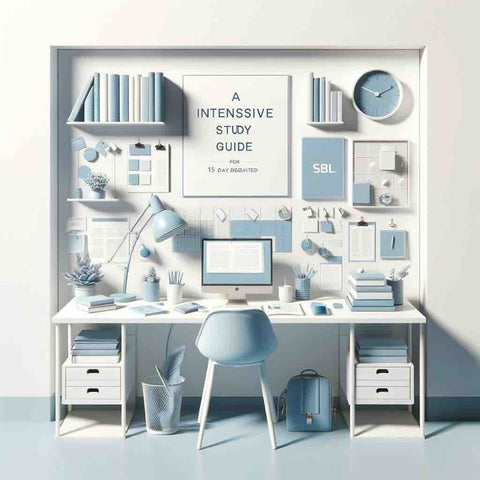How to Study for SBL in 15 Days ACCA Exams
How to Study for SBL in 15 Days: Your Intensive Prep Guide
Preparing for the Strategic Business Leader (SBL) exam in 15 days might seem daunting, but with a well-structured approach and dedication, it's achievable. The SBL exam, known for its emphasis on applying professional judgment and demonstrating professional skills, requires candidates to think like senior leaders. Here's how you can maximize your study time and efforts efficiently.

Day 1: Understand the Syllabus and Exam Structure
Morning. Start by understanding the SBL syllabus. Know the learning outcomes and how they're assessed.
Afternoon: Familiarize yourself with the exam structure. Understanding the types of questions and the marking scheme is crucial.
Evening: Outline your study plan. Divide the syllabus into manageable sections to cover over the next few days.
Day 2-4: Thematic Study Blocks
Focus on thematic blocks of the syllabus. For example, dedicate:
- Day 2 to Governance, Ethics, and Professionalism.
- Day 3 to Leadership and Management.
- Day 4 to Strategy, Risk, and Innovation.
Use mornings for learning concepts, afternoons for practice questions, and evenings for reviewing weak areas.
Day 5-7: Integrate Knowledge with Case Studies
Each Day: Pick different case studies that cover various syllabus areas. Practice applying your knowledge to these cases.
- Morning: Read and outline solutions to case studies.
- Afternoon: Compare your solutions against model answers or guidelines.
- Evening: Reflect on feedback and identify areas for improvement.
Day 8-10: Mock Exams
Each Day: Complete a full mock exam under timed conditions.
- Morning: Take the mock exam.
- Afternoon: Review your answers.
- Evening: Focus on areas needing improvement.
- Use the BPP ECR mock for extra practice
Day 11-13: Focus on Weak Areas
Based on your mock exams, identify and focus on weak areas.
- Morning and Afternoon: Deep dive into these topics.
- Evening: Practice case study questions on these topics.
Day 14: Final Review
Spend the day reviewing all areas of the syllabus, focusing on high-level understanding and connections between topics.
Day 15: Rest and Mental Preparation
- Morning: Light review, especially of your summary notes and key concepts.
- Afternoon: Rest, relax, and engage in light exercise.
- Evening: Early to bed. Ensure you're well-rested for the exam day.
Additional Tips on how to study for SBL
- Stay Healthy: Keep a balanced diet, stay hydrated, and ensure sufficient sleep.
- Practice Professional Skills: Communication, analysis, skepticism, and evaluation are crucial.
- Time Management: During the exam, allocate your time wisely between questions.
- Utilize BPP Study Materials and ECR Training: Incorporate BPP's comprehensive study books and ECR training sessions into your study plan for expert guidance. These resources are specially tailored to cover all examinable topics thoroughly. You can purchase these materials at a discount through Eduyush, providing an economical way to access high-quality study aids.
By following this intensive study plan, you'll be well-prepared to tackle the SBL exam confidently. Remember, success in SBL is not just about hard work but also about studying smart and applying your knowledge strategically and professionally. Good luck!
From the blog
View allFAQs
There are several ways to prepare for the ACCA exams, including studying the exam syllabus and practicing past exam questions. You can also attend review courses or hire a tutor to help you prepare. It's also a good idea to create a study schedule and stick to it, and to take breaks and pace yourself during your studies.
If you fail an ACCA exam, you will need to re-register and pay the exam fees again. You may also want to consider reviewing the exam syllabus and studying more before attempting the exam again. It's also a good idea to talk to your tutor or mentor for guidance and to get feedback on where you may have gone wrong.
There is no limit to the number of times you can attempt the ACCA exams, but you will need to pay the exam fees each time you register. It's a good idea to carefully review the exam syllabus and consider seeking additional help if you are struggling to pass the exams after multiple attempts.
ACCA Exams are held four times a year for skill level and strategic level exams. These are held every quarter
March, June, September and December
The CA (Chartered Accountant) qualification is offered by the Institute of Chartered Accountants of India (ICAI). The ACCA qualification is offered by the Association of Chartered Certified Accountants (ACCA).
The CA qualification has been in existence for over 150 years, and is a globally recognised qualification. The ACCA qualification has been in existence for over 100 years, and is also a globally recognised qualification.
The CA qualification is available in India only, while the ACCA qualification is available in over 180 countries.
The ACCA subjects are assessed on a 100-point scale. The pass mark is 50 points. A score of 60 or more is required to achieve the grades of distinction, credit, and merit.
Yes. Passing all exams with a high percentage is an excellent accomplishment and demonstrates that you have a high level of understanding of the material. Employers will see this as evidence of your competence and be likely to consider you for a position if you are looking for work in the accounting field.
The hardest ACCA paper is the F5 performance management paper. This is because it requires a detailed knowledge of financial accounting and management accounting in order to pass.
Other papers that are difficult include the F7 financial reporting paper and the P2 advanced auditing and assurance paper. However, all of the ACCA papers are challenging, so it is important to thoroughly prepare for each one before sitting the exam.

















Leave a comment